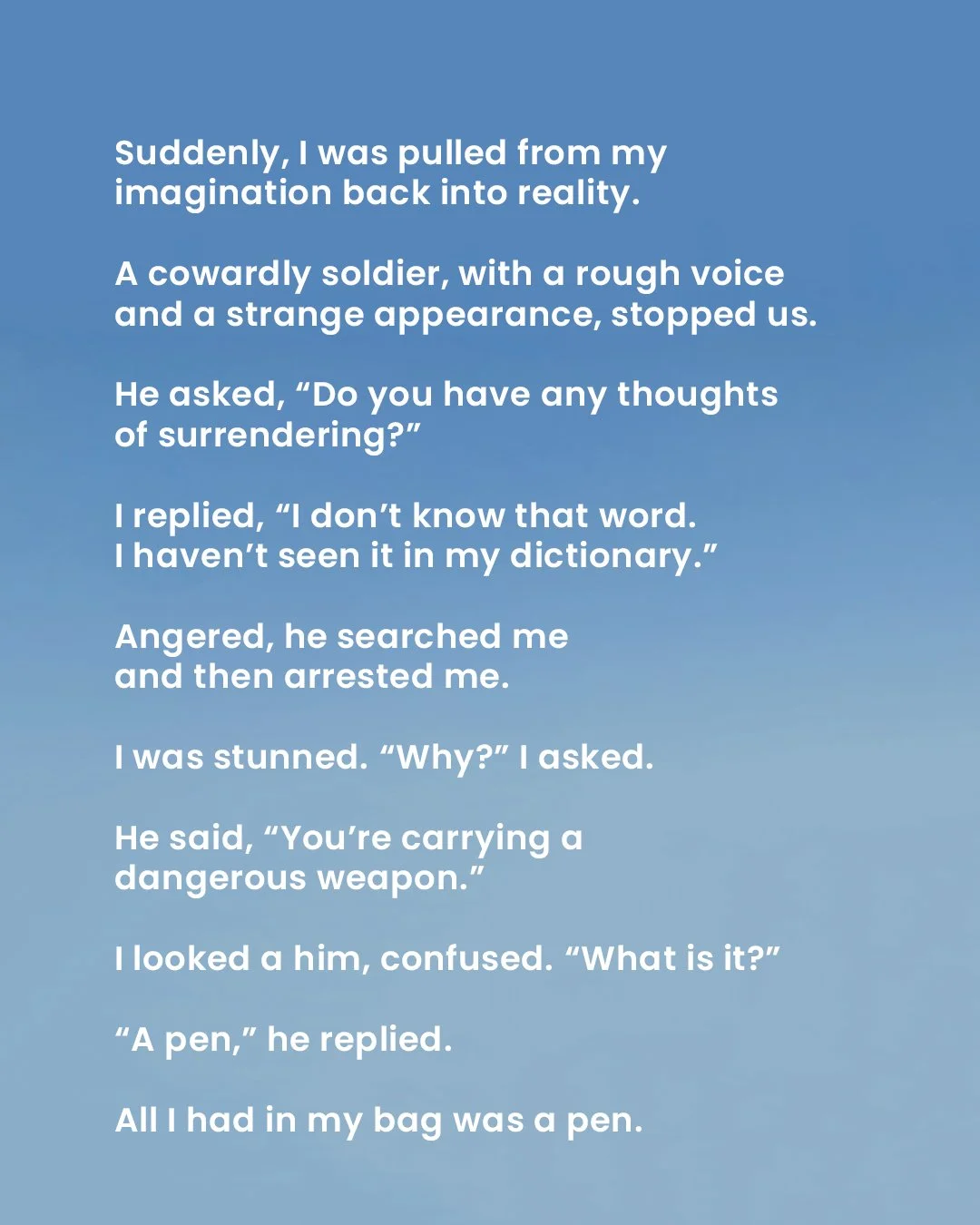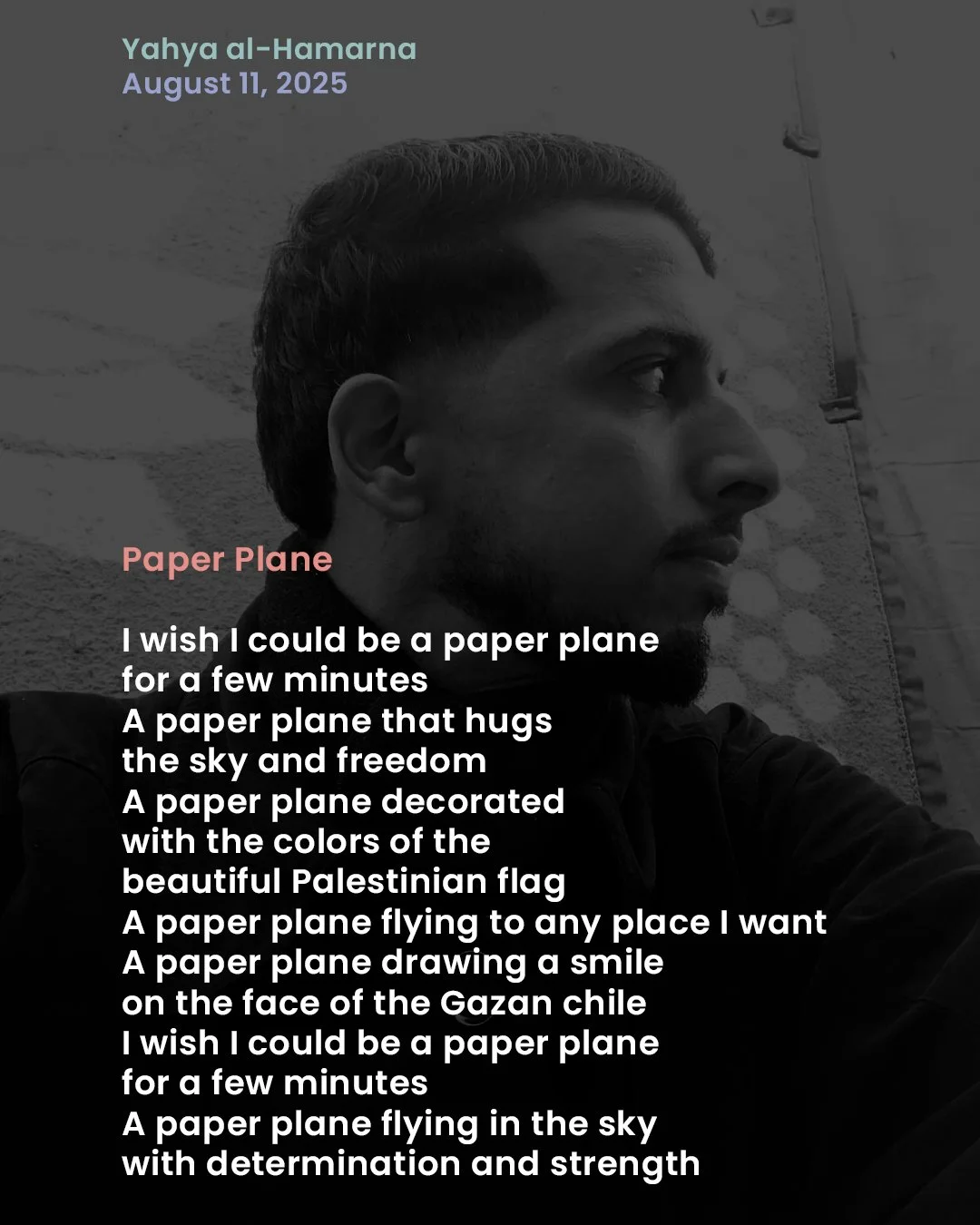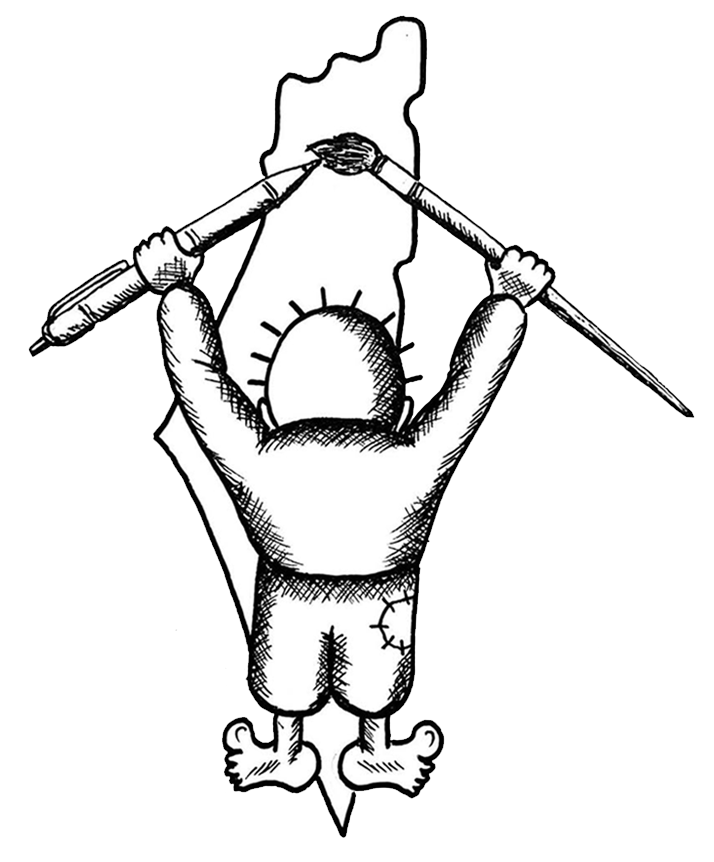Yahya Al-Hamarna
Yahya Al-Hamarna is a 24-year-old writer and poet from Gaza City. He was studying international relations and diplomacy (political science) at Al-Azhar University, before the school was destroyed by the IOF in both October and November 2023.
His first book, My Voice Cannot be Bombed, was just published in August 2025 by Iskra Books.
“In his luminous debut, Yahya Al Hamarna documents the brutalities of war alongside the fragile rituals of everyday life—studying, walking to the park, reading poetry, preparing tea, mourning, surviving.
From the cramped intimacy of displacement tents to the imagined serenity of university lectures and Real Madrid matches, Al Hamarna crafts a poetics of survival: one that refuses despair and insists on the unconquerable dignity of the Palestinian people.
Through diaristic reflection, stark testimony, and vivid lyricism, Al Hamarna’s work resists the machinery of occupation with quiet force. With grace and fury, My Voice Cannot Be Bombed speaks from the rubble and into history.”
Yahya wrote most of his book in a tent, while under constant displacement.
“The bombing cuts short every idea before it is complete. Sometimes I wrote on torn paper, other times on my small phone by candlelight. But this just reminded me that writing is not a luxury, it’s a necessity.”
Yahya has been keeping a daily diary throughout the genocide, which can be followed through his Substack or Instagram.
Yahya is in the process of resuming his bachelor’s degree studies online. In the future, he also wants to pursue a master’s degree. In the meantime, he’s continuing to write.
“I was writing to remember that I was alive – and to prove that a voice can emerge, even from under the rubble.”
Read writing from Yahya
The Sound of Birds
Good morning my adored homeland
it is 7am in Jerusalem time, the capital of Palestine.
Maybe I can say I am winning today with the title of active man,
I arranged the wood logs and lit them up to make my coffee and in my hand is Shakepeare’s theatre work.
The sky is clear and the sun is beautiful.
Coffee and book and calmness with the sound of birds chirping.
The sound of children started coming out playing to forget the cruelty of the war.
A little I face war and I make beautiful things, there are things stronger than the sound of bombing which doesn’t stop.
I dream one day soon to wake up, me and my neighbours, the kids to the sound of birds that sing without the sound of bombs, without an evil and malicious bombing, just the sound of birds.
I don’t want more than the sound of the birds.
The Seventy Seventh Survival Journey
Introduction
Displacement is not merely a physical move from one place to another; it is an uprooting, a displacement of memory from its soil, and a displacement of the soul before the body. Today, as I write these words, I find myself embarking on my seventy-seventh journey of survival, a journey that adds to a long record of ongoing displacement that has left me with no home to settle in, no room to feel secure in, no street to walk on without fear.
Gaza, once my heart's home, has become a temporary space of escape. I flee from north to south, from city to camp, from home to open spaces, as if my destiny is to wander aimlessly, searching for safety that evaporates every time I arrive in a new place.
Chapter Three: The Burdened Memory
Every time I take a step on this new journey, my memory returns to what I lost:
My university, which was the stage for my ambition. My school, which was my first path to knowledge. The alleys of the camp, which taught me the meaning of friendship and neighborliness. The street where I played as a child, now a ruin that repels passersby.
The memories don't go away; they haunt me, as if insisting on reminding me that I have been uprooted.
Chapter Four: Collective Pain
I am not alone on this journey. Thousands of families have been displaced like me, and each face tells a new story of displacement. A woman carrying her sick child, an old man dragging his heavy steps, children crying from hunger and fear. It's a heart-melting collective scene, but it also gives me a strange sense of unity, as we all share the same tragedy.
Chapter Five: Displacement as Identity
After 77 displacement journeys, displacement is no longer just a passing experience; it has become an identity imposed on me by force. I have come to know the map of Gaza by the routes of escape, not by the paths of life. I know the locations of shelters more than I know the locations of parks.
Perhaps the number is no coincidence; the number of times we have been displaced equals the number of years of the Israeli occupation of Palestine: 77 years of uprooting, displacement, and oppression.
Chapter Six: Between Staying and Leaving
With every displacement, the question arises: Do we stay here or move further? But the truth is that moving further is not always an option. Borders are closed, the sky is restricted, and the sea is besieged. All we can do is continue our journey of survival within a small circle, one that doesn't allow for dreams or comfort.
Chapter Seven: Searching for Hope
Despite everything, I still search for hope. I cling to words, to writing, which gives me a space of freedom amidst restrictions. Perhaps I write to keep from dying inside, and perhaps I write to preserve the memory of a city that is being erased before my eyes.
Chapter Nine: Homelessness in Language
Homelessness is a heavy word, but it has become part of our daily lives. Today, I am homeless in my own country, without a home, without a room, without privacy. I am also homeless in my language, as I search for new words to describe the indescribable: How can words bear the magnitude of the loss? How can they narrate the feeling of the seventy-seventh displacement?
Chapter Ten: A Journey That Has Not Yet Ended
This is not the end. The seventy-seventh journey of survival is not the last, and perhaps another journey will follow, but I write to document it, to tell the world that we are still here, despite all attempts at erasure. Displacement will not kill our memory, nor will it erase our sense of belonging. We may now be scattered between southern and northern Gaza, between camps and shelters, but we carry our homeland in our hearts.
Hope among the rubble
"Guess what?"
Spring ask me
and I answer with colors
next to my tent, I planted seeds of hope
and small olives
and trees whispering of the future.
"One day"
my heart whispers to the earth
every seed grows a dream
every branch raises its head toward the sky
we will build tomorrow from threads of light
"I am here, don't leave."
my hands reach out to touch the small branches
I defy the erasure i defy absence
I plant hope among the rubble.
"Embracing the sky"
I raise my face to the sun
I drink the rain like drinking longing
I plant patience in every inch
and I speak to the winds
the melodies of freedom.
Discover more Gaza writers & artists
Follow the links below to see a list of other creative individuals in the Strip to support and amplify.






